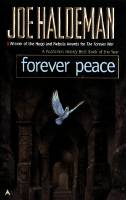| Joe
Haldeman Joe Haldeman's awards include the Hugo, the Nebula, and the World Fantasy Award. His SF classic, The Forever War, along with The Hemingway Hoax, and the Worlds trilogy are just a few of the titles that have made him a household name in the realm of SF. A Vietnam veteran, he is currently an adjunct professor teaching writing at MIT. - Bibliografija |
| Večiti
mir Joe Haldeman
Once again, Haldeman shows us warfare through the eyes of an educated conscript. In an echo of the Gulf War, this war is being waged by an Alliance (essentially, the West's economic titans) against rebel forces in smaller, weaker states and the technological gulf between the forces is vast. However, this is no depersonalised air war where the faces of your victims need not trouble you and your targets are great armies or naval fleets; this conflict bears more of a resemblance to the Central American wars which the US fought by proxy in the Reagan years. Instead of being sent to fight in person, Haldeman's warriors are connected by an advanced telepresence system to heavily armed electronic fighting drones. This link enables members of a combat team to not only communicate their thoughts but also their feelings: while they remain aware of themselves as distinct entities, they are also aware of one other's reactions to what they see and do, be it one soldier's horror at the consequences of his fire going astray or another's glee in his sense of power amid the carnage. This both brings the group closer together - there is no room for illusions about one another's feelings, and no way to hide off-duty relationships - and increases stress levels as the polite circumlocutions and tactful responses that lubricate social interaction are impossible to sustain once you have rejoined the linked troop. Keeping secrets while linked is quite impossible. This all sounds like familiar Haldeman territory with a cyberpunk twist; the rigours of combat (mental and emotional rather than physical in this scenario) are well described, and Haldeman sketches an interesting picture of a world where an academic must combine his role as a part-time warrior with his 'normal' life of lectures and academic politics and relationships. However, no sooner have we started to grasp this situation than two major events turn the world on its head. Firstly, the central character's lover, a physicist, discovers that a physics experiment being carried out in the outer solar system runs the risk of causing destruction on an unimaginable scale. Secondly, some implications of the long-term effects of the troopers' neural links come to light which suggest that human nature itself may be malleable in ways no-one had foreseen. These two plot developments drive the remainder of the novel, as Haldeman's characters try to decide how to cope with what could be The End Of The World As We Know It in two very different respects, and find themselves forced into taking decisions in secret which may have far-reaching and possibly irreversible effects on humanity's development. Haldeman's central characters are convincingly fleshed out, and he depicts the effects of the enormous burdens they find themselves labouring under well. These characters are not as isolated from the society they are defending as those in 'Forever Peace', and of course they are better able to empathise with their opponents than Haldeman's earlier group of reluctant warriors. As always, Haldeman depicts the reactions of ordinary people to the sudden, almost random effects of military action very effectively: being physically distant does little to ease the guilt and horror of seeing human bodies mangled because of one's actions. My one complaint about 'Forever Peace' is that Haldeman's throwing two quite literally Earth-shaking plot developments at one character more or less simultaneously placed a severe strain upon my willing suspension of disbelief, but if you can accept that the central character could find himself in such a position then what follows is logical, if somewhat depressing. 'Forever Peace' is not as compelling as its predecessor, but it does form an interesting companion piece to Haldeman's masterpiece.
|
 Joe
Haldeman's first major success, 'The Forever War', is one of my
favourite novels. Drawing heavily on the author's VietNam
experiences, it depicted a futuristic war in which the time dilation
effects arising from travelling to war by wormhole made Haldeman's
soldiers almost as alien to the society they were defending as the
race they were defending it against. Now, twenty years on, Haldeman
has delivered 'Forever Peace', which has been described as a
'thematic sequel' to its Hugo-winning predecessor.
Joe
Haldeman's first major success, 'The Forever War', is one of my
favourite novels. Drawing heavily on the author's VietNam
experiences, it depicted a futuristic war in which the time dilation
effects arising from travelling to war by wormhole made Haldeman's
soldiers almost as alien to the society they were defending as the
race they were defending it against. Now, twenty years on, Haldeman
has delivered 'Forever Peace', which has been described as a
'thematic sequel' to its Hugo-winning predecessor.